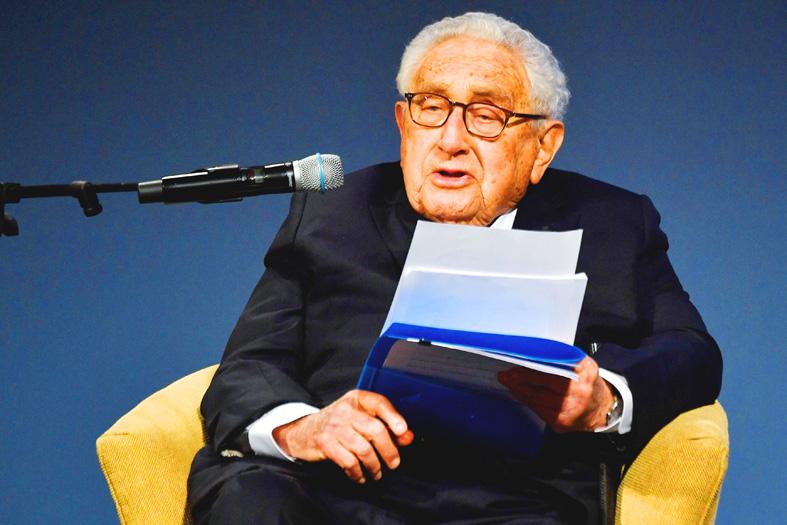Former US secretary of state Henry Kissinger said he does not foresee a Chinese military invasion of Taiwan in the next decade, although it is “perfectly possible” that China could seek to weaken the island’s status.
“I don’t expect an all-out attack on Taiwan in, say, a 10-year period, which is as far as I can see,” Kissinger said yesterday in an interview on CNN’s Fareed Zakaria GPS.
Kissinger, 98, who also served as national security adviser and helped pave the way for then-US president Richard Nixon’s historic 1972 visit to China, said that “everyone wants to be a China hawk” and “everyone assumes that China is determined to dominate the world and that that is its primary objective.”

Photo: AFP
However, he said there should not be an impulsive rivalry and competition with the US, and that he thinks US President Joe Biden during the virtual summit last week with Chinese President Xi Jinping (習近平) “began to move in a direction of a different road.”
China’s claim that Taiwan is a breakaway province to be retaken by force if necessary was a contentious part of the talks between Biden and Xi. A Chinese Communist Party resolution reflecting Xi’s agenda advocated pushing for a union with Taiwan, although it stopped short of listing unification as a near-term goal.
“We should have a principal goal of avoiding confrontation,” Kissinger said. Still, he said that it is “foreseeable” that China “will take measures that will weaken the Taiwanese ability to appear substantially autonomous.”

Taiwanese can file complaints with the Tourism Administration to report travel agencies if their activities caused termination of a person’s citizenship, Mainland Affairs Council Minister Chiu Chui-cheng (邱垂正) said yesterday, after a podcaster highlighted a case in which a person’s citizenship was canceled for receiving a single-use Chinese passport to enter Russia. The council is aware of incidents in which people who signed up through Chinese travel agencies for tours of Russia were told they could obtain Russian visas and fast-track border clearance, Chiu told reporters on the sidelines of an event in Taipei. However, the travel agencies actually applied

Japanese footwear brand Onitsuka Tiger today issued a public apology and said it has suspended an employee amid allegations that the staff member discriminated against a Vietnamese customer at its Taipei 101 store. Posting on the social media platform Threads yesterday, a user said that an employee at the store said that “those shoes are very expensive” when her friend, who is a migrant worker from Vietnam, asked for assistance. The employee then ignored her until she asked again, to which she replied: "We don't have a size 37." The post had amassed nearly 26,000 likes and 916 comments as of this

New measures aimed at making Taiwan more attractive to foreign professionals came into effect this month, the National Development Council said yesterday. Among the changes, international students at Taiwanese universities would be able to work in Taiwan without a work permit in the two years after they graduate, explainer materials provided by the council said. In addition, foreign nationals who graduated from one of the world’s top 200 universities within the past five years can also apply for a two-year open work permit. Previously, those graduates would have needed to apply for a work permit using point-based criteria or have a Taiwanese company

The Shilin District Prosecutors’ Office yesterday indicted two Taiwanese and issued a wanted notice for Pete Liu (劉作虎), founder of Shenzhen-based smartphone manufacturer OnePlus Technology Co (萬普拉斯科技), for allegedly contravening the Act Governing Relations Between the People of the Taiwan Area and the Mainland Area (臺灣地區與大陸地區人民關係條例) by poaching 70 engineers in Taiwan. Liu allegedly traveled to Taiwan at the end of 2014 and met with a Taiwanese man surnamed Lin (林) to discuss establishing a mobile software research and development (R&D) team in Taiwan, prosecutors said. Without approval from the government, Lin, following Liu’s instructions, recruited more than 70 software